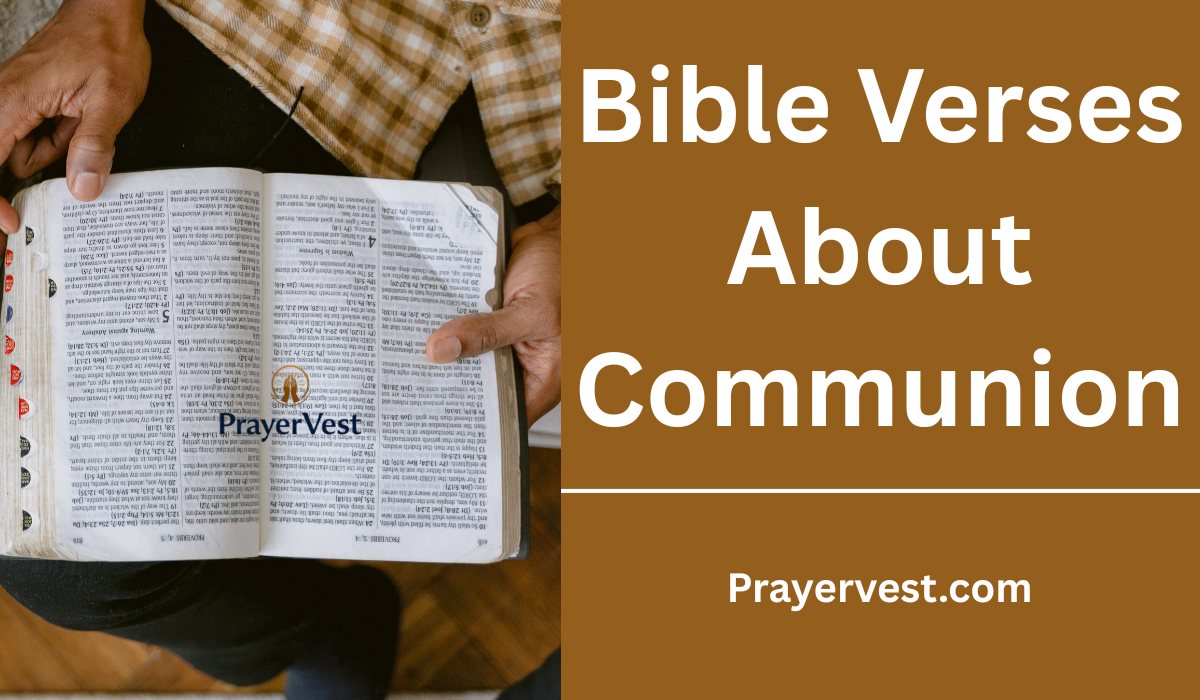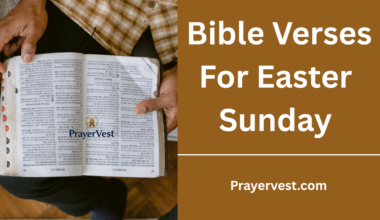One of the holiest customs in Christianity is communion, sometimes referred to as the Lord’s Supper. It represents Jesus Christ’s selfless compassion for people and His great sacrifice. As symbols of Christ’s flesh and blood, the bread and wine are consumed by believers during communion in remembrance of His atonement for sins.
Scripture passages about communion help Christians comprehend its importance, the respect it requires, and the spiritual sustenance it offers to the faithful.
Communion is a collective experience as well as a personal reflection. It strengthens the connection between Christ and His disciples and promotes harmony within the church by bringing Christians together in a common faith. The Bible emphasizes communion’s relational and spiritual aspects, stressing that it is an act of fellowship, obedience, and remembering. These verses exhort Christians to approach the table with humility, thankfulness, and sincerity.


Furthermore, God’s covenant with His people is recalled in Bible scriptures about communion. According to their teachings, communion is a lifelong practice that unites Christians from all walks of life. Believers can better comprehend Christ’s sacrifice, the call to purity, and the transformational power of God’s grace by reflecting on these verses. In the end, communion is a holy time to consider salvation, undergo spiritual rejuvenation, and accept the completeness of life in Christ.
40 Powerful Bible Verses About Communion (2026)
1. Luke 22:19
“And he took bread, gave thanks and broke it, and gave it to them, saying, ‘This is my body given for you; do this in remembrance of me.’”
Jesus institutes communion, teaching His disciples to remember His sacrifice. This verse underscores the importance of reflecting on Christ’s body given for humanity, establishing the Lord’s Supper as a lasting ordinance for spiritual remembrance and connection with God.
2. 1 Corinthians 11:23-24
“For I received from the Lord what I also passed on to you: The Lord Jesus, on the night he was betrayed, took bread, and when he had given thanks, he broke it and said, ‘This is my body, which is for you; do this in remembrance of me.’”
Paul reiterates Jesus’ instructions, emphasizing the sacredness and continuity of the communion practice. This verse teaches believers to observe the Lord’s Supper with reverence, remembering Christ’s sacrifice and participating in His spiritual provision.
3. 1 Corinthians 11:25
“In the same way, after supper he took the cup, saying, ‘This cup is the new covenant in my blood; do this, whenever you drink it, in remembrance of me.’”
Communion symbolizes the new covenant between God and humanity. This verse teaches that the cup represents Christ’s blood shed for forgiveness, calling believers to a covenantal reflection that nurtures faith, gratitude, and spiritual renewal.
4. John 6:53
“Jesus said to them, ‘Very truly I tell you, unless you eat the flesh of the Son of Man and drink his blood, you have no life in you.’”
Jesus emphasizes the spiritual necessity of partaking in His body and blood. This verse teaches that communion is more than symbolic; it is vital for spiritual life, illustrating the deep union between Christ and His followers.
5. Matthew 26:26-28
“While they were eating, Jesus took bread, and when he had given thanks, he broke it and gave it to his disciples, saying, ‘Take and eat; this is my body.’ Then he took a cup, and when he had given thanks, he gave it to them, saying, ‘Drink from it, all of you.’”
This passage records the first Lord’s Supper, highlighting thanksgiving, sharing, and remembrance. It teaches that communion is both an act of worship and a communal experience, connecting believers in shared faith and gratitude.
6. Acts 2:42
“They devoted themselves to the apostles’ teaching and to fellowship, to the breaking of bread and to prayer.”
Early Christians practiced communion regularly as part of their devotion. This verse teaches that partaking in the Lord’s Supper strengthens community, reinforces teaching, and fosters spiritual growth among believers.
7. 1 Corinthians 10:16
“Is not the cup of thanksgiving for which we give thanks a participation in the blood of Christ? And is not the bread that we break a participation in the body of Christ?”
Communion is an act of participation with Christ. This verse teaches that the bread and cup symbolize intimate fellowship with Jesus, deepening spiritual union, and reinforcing believers’ reliance on His sacrifice.
8. 1 Corinthians 11:26
“For whenever you eat this bread and drink this cup, you proclaim the Lord’s death until he comes.”
Communion is a proclamation of Christ’s sacrifice. This verse teaches that the Lord’s Supper is both reflective and declarative, reminding the faithful of the ongoing significance of Jesus’ death and the hope of His return.
9. Hebrews 9:14
“How much more, then, will the blood of Christ, who through the eternal Spirit offered himself unblemished to God, cleanse our consciences from acts that lead to death, so that we may serve the living God!”
Christ’s sacrifice purifies believers. This verse teaches that communion points to spiritual cleansing, reminding Christians that partaking in the bread and cup renews conscience and strengthens commitment to serve God faithfully.
10. Revelation 3:20
“Here I am! I stand at the door and knock. If anyone hears my voice and opens the door, I will come in and eat with that person, and they with me.”
Communion reflects intimate fellowship with Christ. This verse teaches that the Lord’s Supper symbolizes an invitation to close relationship, reminding believers of Christ’s desire for personal and communal connection.
11. Luke 24:30-31
“When he was at the table with them, he took bread, gave thanks, broke it and began to give it to them. Then their eyes were opened and they recognized him, and he disappeared from their sight.”
This verse highlights how communion can reveal Christ’s presence. It teaches that partaking in the bread and cup opens spiritual understanding, helping believers recognize and experience the living Christ in their lives.
12. John 13:1
“It was just before the Passover Festival. Jesus knew that the hour had come for him to leave this world and go to the Father. Having loved his own who were in the world, he loved them to the end.”
Communion is rooted in Christ’s sacrificial love. This verse teaches that the Lord’s Supper reflects Jesus’ ultimate expression of love and devotion, reminding believers to approach the table with gratitude and humility.
13. 1 Corinthians 5:7
“Get rid of the old yeast, so that you may be a new unleavened batch—as you really are. For Christ, our Passover lamb, has been sacrificed.”
Communion connects believers to Christ, the Passover Lamb. This verse teaches that the Lord’s Supper symbolizes spiritual renewal and purification, encouraging Christians to live transformed lives in Christ.
14. Matthew 26:29
“I tell you, I will not drink from this fruit of the vine from now on until that day when I drink it new with you in my Father’s kingdom.”
The Lord’s Supper points to future hope. This verse teaches that communion is not only a remembrance of Christ’s sacrifice but also a celebration of the promise of eternal fellowship with Him in God’s kingdom.
15. Mark 14:22-24
“While they were eating, Jesus took bread, and when he had given thanks, he broke it and gave it to his disciples, saying, ‘Take it; this is my body.’ Then he took a cup, and when he had given thanks, he gave it to them, and they all drank from it. ‘This is my blood of the covenant, which is poured out for many,’ he said to them.”
Communion establishes the covenant of grace. This verse teaches that the bread and cup signify Christ’s covenant with believers, inviting participation in the forgiveness and spiritual blessings of God.
16. 1 Corinthians 11:27
“So then, whoever eats the bread or drinks the cup of the Lord in an unworthy manner will be guilty of sinning against the body and blood of the Lord.”
Communion requires reverence and self-examination. This verse teaches that believers must approach the Lord’s Supper with sincerity and reflection, ensuring their hearts are aligned with God’s will.
17. 1 Corinthians 11:28
“Everyone ought to examine themselves before they eat of the bread and drink from the cup.”
Self-examination is essential in communion. This verse teaches that introspection helps believers recognize personal shortcomings, seek forgiveness, and partake in the Lord’s Supper with a renewed, humble heart.
18. 1 Corinthians 11:29
“For those who eat and drink without discerning the body of Christ eat and drink judgment on themselves.”
Communion requires discernment of Christ’s body. This verse teaches that understanding the significance of the bread and cup is critical, as it ensures spiritual benefit rather than harm to the participant.
19. Acts 20:7
“On the first day of the week we came together to break bread. Paul spoke to the people and, because he intended to leave the next day, kept on talking until midnight.”
Early Christians celebrated communion weekly. This verse teaches that gathering regularly for the Lord’s Supper reinforces community, instruction, and devotion, strengthening both personal faith and collective worship.
20. 1 Peter 2:24
“He himself bore our sins in his body on the cross, so that we might die to sins and live for righteousness; ‘by his wounds you have been healed.’”
Communion reminds believers of Christ’s redemptive sacrifice. This verse teaches that the Lord’s Supper symbolizes the healing, forgiveness, and new life offered through Jesus’ suffering, encouraging gratitude and righteous living.
21. Romans 6:5
“For if we have been united with him in a death like his, we will certainly also be united with him in a resurrection like his.”
Communion reflects spiritual unity with Christ. This verse teaches that partaking in the bread and cup symbolizes our identification with Jesus’ death and resurrection, reminding believers that through communion, they embrace the new life and victory over sin offered in Him.
22. Colossians 1:20
“And through him to reconcile to himself all things, whether things on earth or things in heaven, by making peace through his blood, shed on the cross.”
The blood of Christ brings reconciliation. This verse teaches that communion is a celebration of God’s restoring work, calling believers to live in peace with others and recognize the universal scope of Christ’s sacrificial love.
23. Ephesians 2:13
“But now in Christ Jesus you who once were far away have been brought near by the blood of Christ.”
Communion draws believers near to God. This verse teaches that the Lord’s Supper serves as a tangible reminder that Christ’s blood bridges the gap between humanity and God, inviting participants into intimate fellowship and spiritual closeness with Him.
24. Hebrews 10:19-20
“Therefore, brothers and sisters, since we have confidence to enter the Most Holy Place by the blood of Jesus, by a new and living way opened for us through the curtain, that is, his body.”
Communion symbolizes access to God. This verse teaches that partaking in the bread and cup represents the believer’s confident approach to God, made possible through Jesus’ sacrifice, inviting reverence and continual spiritual boldness.
25. Matthew 5:23-24
“Therefore, if you are offering your gift at the altar and there remember that your brother or sister has something against you, leave your gift there in front of the altar. First go and be reconciled to them; then come and offer your gift.”
Communion calls for reconciliation. This verse teaches that approaching the Lord’s Supper with unresolved conflict hinders its spiritual benefit. It encourages believers to seek forgiveness and restore relationships before partaking.
26. 1 John 1:7
“But if we walk in the light, as he is in the light, we have fellowship with one another, and the blood of Jesus, his Son, purifies us from all sin.”
Communion represents purification and fellowship. This verse teaches that the Lord’s Supper serves as a reminder that through Christ’s blood, believers are cleansed and brought into spiritual unity with God and the Christian community.
27. 2 Corinthians 5:21
“God made him who had no sin to be sin for us, so that in him we might become the righteousness of God.”
Communion emphasizes Christ’s substitutionary sacrifice. This verse teaches that the bread and cup are not merely symbolic—they signify the profound exchange of Christ taking on humanity’s sin so that believers might share in His righteousness.
28. Isaiah 53:5
“But he was pierced for our transgressions, he was crushed for our iniquities; the punishment that brought us peace was on him, and by his wounds we are healed.”
Communion reflects healing and restoration. This verse teaches that partaking in the Lord’s Supper is a spiritual encounter with the healing power of Christ’s suffering, reinforcing gratitude for the peace and redemption His sacrifice provides.
29. Psalm 116:12-13
“What shall I return to the Lord for all his goodness to me? I will lift up the cup of salvation and call on the name of the Lord.”
Communion is an act of thanksgiving. This verse teaches that the Lord’s Supper is a response to God’s goodness, inspiring believers to lift the cup with gratitude, recognizing His mercy and faithfulness in their lives.
30. Luke 22:20
“In the same way, after the supper he took the cup, saying, ‘This cup is the new covenant in my blood, which is poured out for you.’”
Communion symbolizes covenant renewal. This verse teaches that each time believers partake, they reaffirm their participation in the new covenant, embracing Christ’s sacrifice and the ongoing promise of grace, forgiveness, and spiritual life.
31. 1 Corinthians 10:21
“You cannot drink the cup of the Lord and the cup of demons too; you cannot have a part in both the Lord’s table and the table of demons.”
Communion calls for spiritual purity and devotion. This verse teaches that the Lord’s Supper is meant for wholehearted commitment to Christ, emphasizing that believers must reject influences contrary to God’s will to partake meaningfully.
32. 1 Corinthians 11:17
“In the following directives I have no praise for you, for your meetings do more harm than good.”
Proper observance of communion matters. This verse teaches that the Lord’s Supper must be approached with sincerity and unity, warning that careless or divisive practice can undermine its spiritual significance.
33. 1 Corinthians 11:20
“So then, when you come together, it is not the Lord’s Supper you eat.”
Communion requires reverence. This verse teaches that partaking without respect or awareness diminishes the sacredness of the Lord’s Supper, reminding believers to approach the table with humility and intentionality.
34. 1 Corinthians 11:33
“So then, my brothers and sisters, when you gather to eat, you should all eat together.”
Communion emphasizes unity. This verse teaches that the Lord’s Supper is both a personal and communal act, fostering fellowship and equality among believers as they share in the bread and cup.
35. Revelation 19:9
“Blessed are those who are invited to the wedding supper of the Lamb!”
Communion points to eternal fellowship. This verse teaches that the Lord’s Supper foreshadows the ultimate celebration with Christ, inspiring believers to partake with anticipation of eternal communion in God’s kingdom.
36. John 15:4
“Remain in me, as I also remain in you. No branch can bear fruit by itself; it must remain in the vine. Neither can you bear fruit unless you remain in me.”
Communion fosters abiding in Christ. This verse teaches that partaking in the bread and cup is a spiritual act that strengthens believers’ connection to Jesus, ensuring spiritual growth, fruitfulness, and ongoing life in Him.
37. Galatians 2:20
“I have been crucified with Christ and I no longer live, but Christ lives in me. The life I now live in the body, I live by faith in the Son of God, who loved me and gave himself for me.”
Communion reinforces identification with Christ. This verse teaches that the Lord’s Supper reminds believers that their old self has died with Christ, and through His sacrifice, they live renewed lives in faith and devotion.
38. Romans 5:9
“Since we have now been justified by his blood, how much more shall we be saved from God’s wrath through him!”
Communion celebrates justification. This verse teaches that the bread and cup signify the believer’s justification through Christ’s blood, highlighting salvation as a foundational reason for participating in the Lord’s Supper.
39. Hebrews 13:15
“Through Jesus, therefore, let us continually offer to God a sacrifice of praise—the fruit of lips that openly profess his name.”
Communion is an act of worship. This verse teaches that partaking in the Lord’s Supper is not only reflective but also expressive, allowing believers to offer praise and acknowledgment of God’s grace through the symbolic elements.
40. Philippians 2:17
“But even if I am being poured out like a drink offering on the sacrifice and service coming from your faith, I am glad and rejoice with all of you.”
Communion reflects self-sacrifice and service. This verse teaches that participating in the Lord’s Supper reminds believers of Christ’s ultimate sacrifice, encouraging them to live lives of service, joy, and dedication in response to God’s love.
Conclusion
Scripture passages about communion serve as a reminder to believers of Jesus Christ’s great love and sacrifice. They stress that eating the Lord’s Supper is a holy chance to consider redemption, get spiritual sustenance, and reaffirm one’s commitment to God, and it is more than just a custom. Christians are urged to approach the communion table with humility, thankfulness, and a heart that is centered on obedience and recollection by reflecting on these Scriptures. Understanding Christ’s sacrifice and its transformative effect in each believer’s life is strengthened by each verse.
Additionally, communion promotes harmony and camaraderie within the church by fortifying the ties that bind believers together. These verses from the Bible serve as a reminder that communion unites Christians over time and space in a common faith and is both an individual and a group act. Believers receive spiritual renewal, a renewed dedication to Christ, and a palpable feeling of His presence via the practice of communion. In the end, these passages encourage awe, devotion, and ongoing contemplation of God’s mercy, love, and grace.






